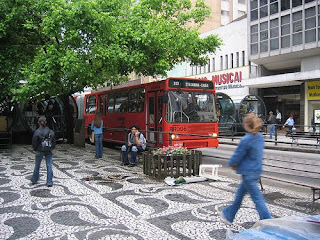
“
Lessons in Governance From Urban Brazil,” a recent event co-sponsored by the Wilson Center’s Brazil Institute and Comparative Urban Studies Project, highlighted how Curitiba, the capital city of the southern state of Parana, has used urban planning to strengthen environmental security.
Following a rapid wave of industrialization in the 1960s, small Brazilian cities were overwhelmed by urban growth. In anticipation of growth’s negative outcomes, the city of Curitiba established the Urban Planning Institute of Curitiba (IPPUC), led by urban visionary Jamie Lerner. Concerned about degradation due to urban sprawl, Lerner created an affordable, extensive, efficient bus system—and completely altered existing road infrastructure to allow for it. Its success is unprecedented.
While Curitiba has one of the highest rates of personal car ownership in Brazil, more than 70 percent of the population uses the bus to commute to work, translating into less traffic congestion and lower levels of air pollution.
Due to its flat terrain, Curitiba suffers from poor drainage and dangerous flooding. Lerner and his team established numerous urban parks to absorb floodwater and stem the damage it inflicts upon poorer city residents, who often live in more vulnerable parts of the city. Since 1965, Curitiba has broken ground on 26 separate parks.
Curitiba was also the first city in Brazil to establish mandatory recycling. Profits generated through resale of recovered material are funneled into social programs; the city often employs its homeless to help with the separation of recyclables. In one of the strongest examples of how helping people and their environment can be mutually beneficial, Curitiba encourages its favela residents to collect garbage from their neighborhoods and exchange it at designated centers for food and bus passes.
Responding to whether or not Curitiba’s plan was replicable, speaker Ivani Vassoler insisted that imitating the details of the plan was not the point—urban planners must emulate the overall approach. For determined leaders committed to what Vassoler termed a “dynamic blueprint,” the sky is the limit.
By Wilson Center Intern Bronwen DeSena.
Photo: Curitiba’s bus system, courtesy of Henri Bergius and Flickr.
 “Lessons in Governance From Urban Brazil,” a recent event co-sponsored by the Wilson Center’s Brazil Institute and Comparative Urban Studies Project, highlighted how Curitiba, the capital city of the southern state of Parana, has used urban planning to strengthen environmental security.
“Lessons in Governance From Urban Brazil,” a recent event co-sponsored by the Wilson Center’s Brazil Institute and Comparative Urban Studies Project, highlighted how Curitiba, the capital city of the southern state of Parana, has used urban planning to strengthen environmental security. A Publication of the Stimson Center.
A Publication of the Stimson Center.




